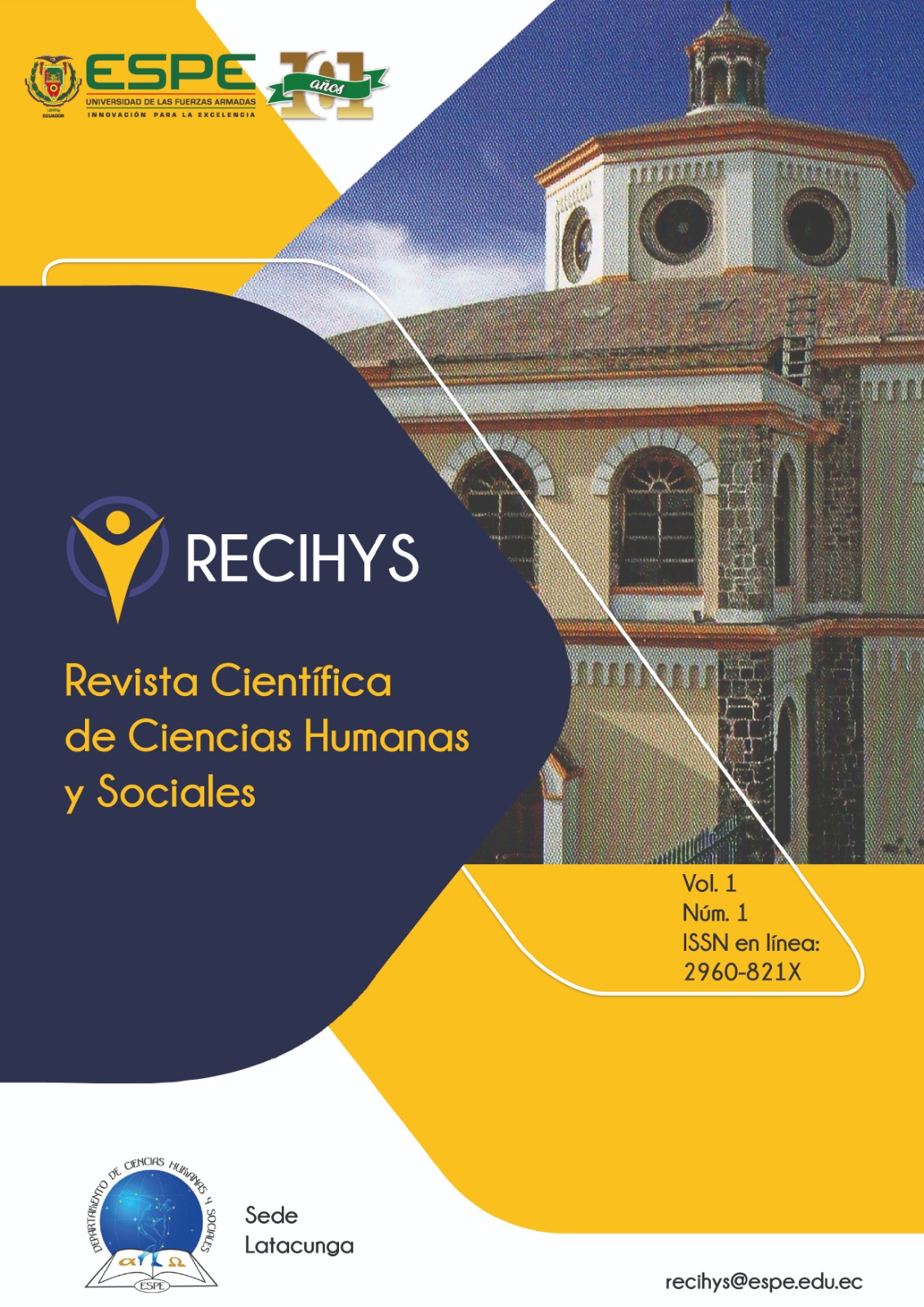Title of the article in English: Using creative strategies “digital puppets” to promote students' speaking skills
Main Article Content
Abstract
Speech is the most complex skill to develop when learning the English language. As such, it is essential to use authentic resources to facilitate their development. For this reason, the objective of this research work was to determine the influence of puppets on the ability to speak in eighth-grade students of the Antonio Carrillo Moscoso Educational Unit of Pillaro Canton. The research used a mixed cross-sectional approach. In addition, it required a quasi-experimental design with a control group and an experimental group. Additionally, a total of 36 students participated in the study, 18 girls and 18 boys aged 12 to 13 from classrooms A and B. Likewise, the information was collected through the application of a pre and post test. The same one that was taken from the speech section of the KET A2 validated by Cambridge. In the same way, different treatments were applied using strategies such as: plays, oral presentation activities and cooperative exercises to verify the hypothesis. Finally, the Wilcoxon statistical test was used to analyze the data and found that Z has a significance of -3.757b (bilateral) and the signed range was 0.000. The significance was less than 0.05, so the null hypothesis was rejected and the alternative hypothesis was accepted. In conclusion, the puppets helped the students improve their oral expression because the experimental group showed an increase of 2.8 points in the posttest, while the control group only gained 0.3 thousandths. Students also improved four aspects of language such as grammar, vocabulary, pronunciation and interactive communication.
Downloads
Article Details

This work is licensed under a Creative Commons Attribution 4.0 International License.
Authors who publish in this journal agree to the following terms: Authors retain the copyright and guarantee the journal the right to be the first publication of the work, as well as, licensed under a Creative Commons Attribution License that allows others share the work with an acknowledgment of the authorship of the work and the initial publication in this journal. Authors may separately establish additional agreements for the non-exclusive distribution of the version of the work published in the journal (for example, placing it in an institutional repository or publishing it in a book), with acknowledgment of its initial publication in this journal. Authors are allowed and encouraged to disseminate their work electronically (for example, in institutional repositories or on their own website) before and during the submission process, as it may lead to productive exchanges as well as further citation earliest and oldest of published works.
How to Cite
References
Ardhiani, C., Setiyaji , A., Sodiq, J., & Susanto, D. A. (2021). Using hand puppets as media to improve students´ speaking skillthrough narrative text: a case of eighth students of smp n 16 semarang in academic year. English Teaching Journal, 1, 109-123. http://journal.upgris.ac.id/index.php/eternal/article/view/8307/4059
Condo, L. P. (2021). Wlingua app and the listening skill. [Universidad Técnica de Ambato] https://repositorio.uta.edu.ec/bitstream/123456789/31669/1/TasgachoLorena_Tesis_Final_.pdf
Fauza, H., Usman, B., & Muslem, A. (2018). Improving students’ speaking skill and motivation by puppets. English Educational Journal, 2,216-228.
Guato, C. A. (2021). Ted talks in the speaking skill. [Universidad Técnica de Ambato]. https://repositorio.uta.edu.ec/bitstream/123456789/32565/1/TIMBILA%20GUATO%20CYNTHIA%20ARACELLY%20TESIS%20%281%29.pdf
Hussain, S. (2018). Teaching Speaking Skills in Communication Classroom. International Journal of Media, Journalism and Mass Communications (IJMJMC), 3,14-21. https://www.arcjournals.org/pdfs/ijmjmc/v3-i3/3.pdf
Khalil, A. H., Nagar, E., & Awad, M. (2019). The Effect of Brain-Based Learning on Developing Some Speaking Sub-skills of Egyptian EFL Secondary School Students. International journal of environmental & science education, 14,103-116. http://www.ijese.net/makale_indir/IJESE_2107_article_5cdbda6f72c9e.pdf
Krashen, S. (1982). Principles and practice in second language acquisition. California: Pergamon Press Inc.
Kröger, T., & Nupponen, A. M. (2019). Puppet as a Pedagogical Tool: A Literature. International Electronic Journal of Elementary Education, 11, 393-401. DOI: 10.26822/iejee.2019450797
Llerena, K. A. (2021). Hands-on learning and the speaking skill. [Universidad Técnica de Ambato]. https://repositorio.uta.edu.ec/bitstream/123456789/33364/1/Llerena%20Llerena%20Katherine%20Alexandra_Dissertation.pdf
Maharani, S. (2016). The Use of Puppet: Shifting Speaking Skill from the Perspective of Students’ Self-Esteem. Register Journal, 170-186. https://doi.org/10.18326/rgt.v9i2.170-186
Miller, R. (2020). Difference Between Qualitative and Quantitative Research. Retrieved from Dome essay: https://domyessay.com/blog/qualitative-vs-quantitative
Mujahidah, N., Afiif, A., & Damayanti, E. (2021). The Role of Storytelling Methods Using Hand Puppets in Early Children’s Language Development. Child Education Journal (CEJ), 3, 78-91. DOI:10.33086/cej.v3i2.2129
Prabhakaran, D., & Yamat, H. (2017). Speaking anxiety: discover the power of puppets. Journal of Education and Social Sciences JESOC, 3(2), 79-87. https://www.jesoc.com/wp-content/uploads/2017/04/KC6_50.pdf
Ramadhania, J., & Kristiantari, R. (2021). Paired Storytelling Learning Model Assisted By Paper Puppet Media On Students' Speaking Skills. Dimensions, 4, 524-530. https://doi.org/10.23887/jet.v4i4.27108
Rao, P. S. (2019). The importance of speaking skills in english classrooms. Alford Council of International English & Literature Journal (ACIELJ), 2, 1-12. https://www.acielj.com/Papers/vol2issue2/1.ACIELJ%20-Srinu%20sir%20(1-12)%20OK.pdf
Syafii, M. L., Santoso, S., & Hartono, S. (2021). Story-telling Technique Utilizing Puppets to Enhance the Learners’ Speaking Competence. Eric, 3, 304-341. https://doi.org/10.46328/ijonses.70
Teherani, A. (2015). Choosing a Qualitative Research Approach. ACGMT, 669–670.
Thomas, L. (2020). An introduction to quasi-experimental designs. Retrieved from: https://www.scribbr.com/methodology/quasi-experimental-design/
Vygotsky, L. (1962).Thought and language (E. Hanf-mann & G. Vakar, Trans.). Cambridge, MA: MIT Press
Yolanda, D., & Sofian, M. (2018). Using Puppet Games in Teaching Speaking for Tenth Graders. ELIF, 2, 4824- 3335. Retrieved from: https://jurnal.umj.ac.id/index.php/ELIF/article/view/4824/3355
Zach. ( 2020). Pretest-Posttest Design: Definition & Examples. Retrieved from Statology: https://www.statology.org/pretest-posttest-design/

